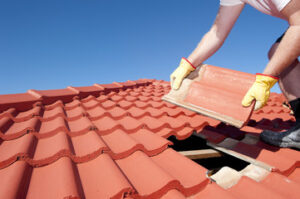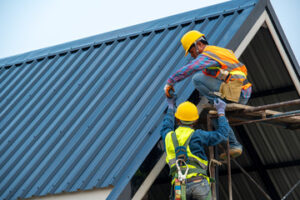Roofing is a physically demanding job that requires strength and stamina. It can be dangerous for those who are not properly trained and equipped to work in all types of weather conditions.

When selecting a roofing company, you should focus on experience and price. It is also important to find out if they are licensed, insured and certified. Contact Roofing Company Brentwood TN for professional help.
Roofing is a demanding and risky trade that requires physical endurance and a focus on safety. However, it also offers a good earning potential and the satisfaction of completing a job well done. For these reasons, it is important to choose a reputable roofing contractor with extensive experience and a strong reputation.
A roofing company’s experience will impact the quality of their work and customer service. Ask about the number of years the roofing company has been in business and their average job size. It is also important to inquire about any previous projects that they have worked on. An experienced roofing company will be able to answer your questions and provide you with a detailed estimate.
When choosing a roofing contractor, look for one with local roots. Those with local connections will be better equipped to understand and address the unique challenges that arise in your area, such as climate conditions and building codes. Additionally, they will be more accessible for follow-up services and inspections.
A reliable roofing contractor should prioritize safety and adhere to industry regulations. This ensures the health and well-being of their workers as well as property owners and neighbors. They will also be knowledgeable about local building permits and regulations, which helps prevent fines and legal issues down the road.
A reputable roofing contractor will be willing to show you their portfolio and past projects. Look for photos of projects that are similar to yours so you can compare their workmanship and skill level. You should also ask about their warranty policies and whether they offer a guarantee on their materials and workmanship. A warranty is a powerful indicator of a roofing company’s confidence in their work.
License
When you hire a roofing contractor, you want to make sure that they have the proper licenses and insurances. This will protect you from any legal issues in the event of any accidents or injuries during the project. Additionally, it will help ensure that the work is done according to all applicable building codes and regulations. In addition, it will give you peace of mind knowing that your roof is in good hands.
Depending on your state, there are different requirements for roofing contractors. Most states and localities have online portals where you can verify a roofing contractor’s licensing status. These websites typically require you to enter a name or license number and will provide instant results. Some also include additional information about bonding and insurance. However, the availability and depth of this information varies by region, so it’s important to do your research before hiring someone.
In order to become a licensed roofing contractor, you will need to have several qualifications, including experience and training. You may also be required to pass a background check and criminal history check. Many states also have continuing education requirements that must be completed to maintain your license. In addition, you may be required to have liability and workers’ compensation insurance, as well as business insurance.
If you are a new roofing contractor, you should consider getting professional training from a reputable roofing school. This will help you learn the skills and techniques needed to become a successful roofer. In addition to providing you with the knowledge and skills, a roofing school will also teach you about safety protocols and how to handle different types of projects.
Roofing is a dangerous job that requires a lot of physical strength and stamina. It is not for the faint of heart, and it can be very rewarding if you do it right. Choosing the right roofing company can make all the difference in your next roofing project. Madden Brothers Roofing is an experienced and licensed roofing contractor that offers quality services to meet your needs. They are dedicated to maintaining the highest licensing standards, so you can feel confident that their work is of the highest quality.
Insurance
Roofing contractors must be insured to protect themselves against lawsuits and other financial liabilities. They should have general liability insurance, workers’ compensation insurance, and commercial auto insurance. Those without these policies put themselves and their clients at risk. Legitimate roofing companies will be able to provide proof of their coverage upon request.
General liability insurance offers protection against third-party bodily injury, property damage, and advertising injuries. Roofing contractors can also buy pollution liability coverage for contamination that occurs during construction. For example, solvents used to spray and seal roofs can be toxic if inhaled. Depending on the nature of damages, insurance policy limits can vary from $1 million to $2 million.
Workers’ compensation insurance covers medical expenses and lost wages for employees who are injured on the job. It is vital for any roofing contractor, as injuries are a common part of the job. A reputable roofing company will ensure that all of their workers have this insurance, and will be able to offer a viable solution if an employee is injured.
Inland marine insurance provides coverage for tools, equipment, and materials while they are in transit or stored offsite. Roofing contractors often use expensive tools and equipment, so this type of insurance is an essential purchase for them. Inland marine insurance typically includes coverage for theft, fire, and vandalism.
Roofing contractors should have commercial auto insurance to cover any vehicles they use for business purposes. This is particularly important in NYC, where traffic accidents are common. This type of insurance is often included in a general liability or workers’ compensation package, and can also be purchased separately.
Builder’s risk insurance is a type of commercial insurance that covers construction projects from start to finish. It offers coverage against fire, vandalism, and other perils, as well as weather events like hail. It is an essential purchase for roofing contractors, and can be purchased through a specialty insurance agency.
Lastly, roofing contractors should have general business insurance, which is an umbrella policy that provides additional coverage above the limits of individual policies. This type of policy is especially important in New York, where insurance costs are high. It is also a great way to demonstrate professionalism and reliability to potential clients.
Reputation
A company’s reputation is an important detail to check before hiring them. This is because it’s an indicator of how often a company evaluates their services and takes coherent improvement measures, which attracts customers and keeps them happy. In addition, a good reputation is an indication that a company is committed to providing excellent service to their customers and is willing to go the extra mile to ensure they meet their needs.
The best way to find out about a roofing contractor’s reputation is through online reviews and testimonials. Many websites offer a rating system where customers can give their experience with the company on a scale of 1 to 5. In addition, most of these sites allow people to leave a comment explaining why they gave a particular score. A 5-star rating shows that a company has consistently delivered great customer service and has satisfied clients.
Besides customer reviews, you should also look at the roofing company’s reputation with local professional organizations like the Better Business Bureau (BBB). The BBB collects information about a business and provides a rating that indicates how trustworthy they are. A 5-star rating is the highest possible score, indicating that a roofing company has a strong track record of customer satisfaction and ethical business practices.
Building a solid roofing business is no easy task. The industry is competitive, and you have to stand out from the crowd. Having a positive online presence is key, but it is equally important to have a team that can help you build and manage your reputation.

